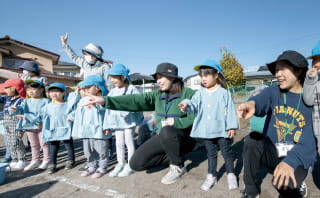- Department of Social Welfare
- Department of Psychology
- Department of Development and Education
Striving for a Community of Mutual Support
Modern society faces many serious challenges, such as population decline, aging, and child poverty. By gaining knowledge, skills, and ethical understanding in welfare, and by actively engaging with local communities, you can begin to see these issues as your own. Let’s deepen our learning together to create a community where everyone, especially those facing life’s difficulties, can live with peace of mind.
-
Personalized Education Programs
Welfare studies deepen through a cycle of lectures (theory), practice, and fieldwork. Additionally, our faculty works closely with students, holding regular meetings to tailor individual education programs that align with each student’s interests and needs.
-
Three Specializations for Becoming a Compassionate Expert
We offer three specializations—Social Welfare, Psychology, and Development & Education—to help you become a specialist who can support people facing life’s challenges. You’ll develop the necessary knowledge, skills, ethical standards, and communication abilities.
-
Rich Experiential Learning through Internships and Off-Campus Programs
Experiences gained through internships and off-campus programs are crucial for deepening your understanding of social welfare. These experiences not only enhance your knowledge and skills but also provide insights into the diverse welfare challenges in the community.
Field of Social Welfare

To Become a Social Welfare Professional Who Connects with and Supports the Community.
We offer a broad education in social welfare, covering everything from support for the elderly, disabled, and children in the community, to mental health care and child-rearing support. Our goal is to prepare you to obtain the national certification needed to become a social worker or mental health social worker. Through hands-on training, you will develop the practical skills necessary to make a meaningful impact in your community.
Key Learning Points
Building an Inclusive Society
Our focus is on creating an inclusive society where everyone can live in a safe environment. This includes fostering better relationships not only between people but also between people and their environment.
Protecting Nature and Communities
We aim to protect nature and create livable communities. In doing so, we strive to build a better social structure that supports both children and the elderly.
Towards a Balanced Society
We are re-evaluating social welfare to achieve a balanced, inclusive society that extends across organizations, communities, nations, and the world.
Career Opportunities
Public Welfare Officer / Social Welfare Council / Hospitals / Support Facilities for People with Disabilities / Child Welfare Facilities / Elderly Care Facilities / Graduate School Advancement, and more
Research Areas and Seminar Themes
Field of Psychology

Developing Skills to Understand and Support Human Thoughts and Behaviors
By exploring the many challenges of modern society through both psychology and social welfare, students develop practical skills while building a solid foundation in psychology as a human science. The curriculum is designed to provide a balanced combination of social welfare and psychology courses, equipping students with the practical skills needed to meet the growing demand for psychology professionals.
Key Learning Points
Reflecting on Yourself
Discover research themes that deeply relate to daily human life, and deepen your self-understanding by reflecting on your own experiences.
From Fundamental Theories to Practical Learning
Learn the foundational theories related to psychological phenomena, while also gaining practical experience with measurement techniques such as experiments, surveys, and assessments.
Acquiring Specialized Knowledge for Interpersonal Engagement
Gain knowledge in areas like counseling and psychological testing, which help in understanding human psychology and behavior in everyday life and support interpersonal relationships.
Career Opportunities
Graduate School Advancement / Psychology-related Public Service Positions (such as Legal Technical Officer, Legal Instructor, Family Court Probation Officer, Child Consultation Center Psychological Examiner) / Medical Facilities / Welfare Facilities (such as Childcare Institutions) / School Counselor / Human Resources and Mental Health Management in Companies, and more.
Specialized Fields and
Research Themes
| Kazuhiro Kobayashi | Juvenile Delinquency and Criminal Psychology / Correctional Psychology / Forensic Welfare / Green Care "Understanding Delinquent and Criminal Behavior and Promoting Social Inclusion" |
|---|---|
| Tadashi Endo | Social Psychology / Developmental Psychology "Measuring Stereotypes and Prejudices and Identifying Factors that Reduce Prejudice" |
| Kaoru Hirakue | Clinical Psychology / Psychotherapy / Rorschach Test "The Relationship Between Adaptive Emotional Experiences and Mindfulness" |
Field of Development and Education

Providing a Safe and Supportive Learning Environment for All Children
In today's schools, where many children require special attention and support, we aim to train professionals who not only have expertise in education but also in welfare and developmental disabilities. These professionals will be capable of collaborating with various specialists involved in children's care. We frequently visit schools to ensure a high level of teacher training, combining theory with practical experience.
Key Learning Points
Rethinking Modern Education
In today's diverse and complex society, the challenges and needs in education are multifaceted. It’s important to integrate not only traditional educational methods but also social welfare perspectives.
Education that Supports Children
There is a growing need for an educational approach that supports children with developmental challenges—something that goes beyond conventional teaching methods.
Leveraging Social Welfare Perspectives
By gaining knowledge in social welfare, which is crucial for developmental education, we prepare to address the educational needs of the future.
Career Opportunities
Special Education Teacher / Elementary and Middle School Teacher / High School Teacher / Advancement to Graduate School, and more.
Specialized Fields and
Research Themes
| Yuichi Aoki | Special Education "Developmental Support to Promote Joint Attention, Emotional Regulation, and Collaborative Activities in Children with Autism Spectrum Disorder" |
|---|---|
| Hidehiko Iizuka | Civics Education / Moral Education / Open Curriculum for Society "The Impact of School Education on High School Students' Awareness of Social Participation" |
| Michiari Kataoka | Curriculum Studies / Curriculum Management "Research on Community Learning to Achieve Social Inclusion" |
| Takahito Tanno | Special Education / Independent Living Activities "Enhancing the Professionalism of Teachers and Supporters Towards Realizing an Inclusive Society" |
| Jun Hayasaka | Educational Methods / Building Schools in Collaboration with Communities / Community-School Collaborative Activities "Developing Education Through Collaboration and Cooperation with Diverse Others" |
